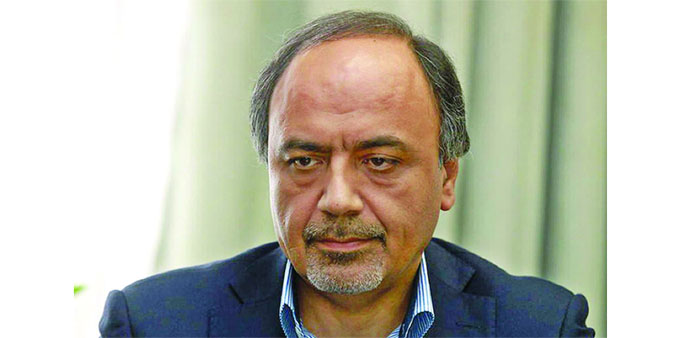Agencies/Washington
The United States said yesterday it will not issue a visa to Iran’s chosen UN envoy Hamid Abutalebi because he was involved in the 1979 hostage crisis at the US embassy in Tehran.
“Given his role in the events of 1979, which clearly matter profoundly to the American people, it would be unacceptable to grant this visa,” State Department spokeswoman Jen Psaki told reporters.
It was the first time that Washington has publicly linked Abutalebi to the hostage crisis when some 52 American diplomats and staff were held for 444 days by Iranian students.
The protracted standoff profoundly shocked the United States and led to the severing of all diplomatic ties between the US and Iran for the past three decades.
The spat over Abutalebi’s nomination to be the new envoy to the United Nations has blown up amid a cautious thaw in relations as Tehran’s new leadership seeks to negotiate a nuclear treaty with global powers.
On Monday Iran urged UN Secretary General Ban Ki-moon to intervene directly in the row.
As the host government, the United States is normally obliged to issue visas to diplomats who serve at the United Nations. Abutalebi has previously attended sessions at the UN headquarters in New York.
But there are “limited exceptions” including whether the US has concerns about security or terrorism involving the nominee.
Psaki said Washington was “not going to get into any specifics of what we do or don’t think he was involved in during the hostage crisis” adding “he himself has said he was involved.”
“As we all know, this was a searing experience for 52 American citizens who were held hostage. And for that reason, you know, this is a visa we cannot grant.”
US officials have privately said the visa application has not been denied outright, and are hoping that Tehran will pick another nominee.
But on Monday Iran’s foreign ministry spokeswoman Marzieh Afkham reiterated the country’s position.
“The official mechanisms for lodging the complaint at the United Nations have been activated, and are under way,” she said in remarks published on state broadcaster IRIB’s website.
It is believed that the US has never previously denied a visa for a UN ambassador, although Tehran withdrew its nominee once in the early 1990s.
Meanwhile, President Hassan Rohani said yesterday international sanctions on Iran would unravel in months following negotiations with world powers on its nuclear programme, the official Irna news agency reported.
Some international sanctions imposed over Iran's nuclear programme have been eased temporarily after a deal was reached last year with world powers, but Washington has said the lifting of sanctions can only happen "in total" after a comprehensive deal is reached.
"With your support, this government has taken the first steps towards the lifting of the brutal sanctions ... We will witness the sanctions shattering in the coming months," Rohani told a crowd during a tour of Sistan-Baluchestan, a restive underdeveloped province bordering Pakistan.
"Today we already see the sanctions unravelling," he said, according to Irna, referring to the modest easing of sanctions in return for concessions made by Rohani's government in nuclear talks with world powers.
The president blamed both the sanctions and "tactless policies" by the previous hardline administration of Mahmoud Ahmadinejad for the economic hardship faced by his nation.
"Due to the brutal sanctions and unwise administration, our country has faced myriad problems in the past years... but we will break down the inhuman sanctions," Rohani said.
"We will prove to the world through these negotiations that what has been said about Iran is a lie. Iran has never pursued nuclear weapons and never will."
Negotiators from Iran and the so-called P5+1 - the US, Russia, China, Britain, France and Germany - met in Vienna last week to start drafting a long-term agreement on settling their decade-old nuclear dispute by a July 20 deadline.
Western powers, along with Russia and China, want to prevent tensions in the Middle East from boiling over into a wider war or triggering a regional nuclear arms race.
Iran exported oil at levels higher than allowed under the sanctions for a fourth straight month in February, ship loading data showed, raising the risk of a crackdown if Washington feels economic pressure is being relaxed too quickly. Iran's main clients are mostly in Asia.

